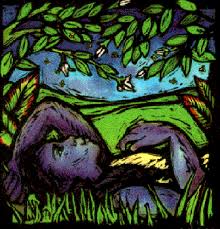
 Their Eyes Were Watching God
Their Eyes Were Watching GodBy Zora Neale Hurston
1937
pp. 184
-- Included on Time Magazine's "100 Best English-language Novels from 1923-2005" list.
This is another one of my favorite books. I remember reading it my senior year of high school and really enjoying it; however, I couldn't remember any details before I reread it this semester. Mostly I remembered being involved in some sort of group project concerning the novel, and we would get together at Starbucks. Mmm...raspberry hot chocolate. Anyway, my love for Their Eyes Were Watching God was recently renewed. Oprah Winfrey loved this book so much, she had it made into a film. After seeing one particular Youtube clip, I must say it looks pretty cheesy, but I think I'm going to have to watch it anyway. I'll let you know how it goes.
The story begins with Janie returning to Eatonville, Florida, an all black community, after spending some time away with her third husband, Virgible Woods, more commonly known as Tea Cake. The town has been gossiping about what supposedly happened to Tea Cake and why he has not returned with his wife, but Janie's good friend, Phoeby, is the only one she takes the time to share the truth with. Janie takes us through all three of her marriages, the role she plays in each, and her progression towards a loving relationship and, eventually, independence. Near the beginning of the novel, her grandmother tells her that the black woman is the mule of the world because when a white man gives a job to a black man, the black man gives it to the black woman. This concept is illustrated throughout the novel, and although Janie's life is difficult, and her story is generally an unhappy one, the reader is able to see Janie grow as a character, overcome her role as "mule of the world," and learn how to live for herself.
Hurston chooses to write the dialogue in the dialect of the time and culture in which the novel takes place. Some find this frustrating, but one cannot deny the effect this dialect has on the spirit of the novel. It is not degrading to the black culture as some people say; the white police officers in the book use the same dialect. I can't seem to put it into words, but this dialect is necessary for this novel to be the masterpiece that it is. This detail helps depict the black community as it was at the time and adds to one of many messages Hurston expresses: although differences between cultures exist, there are certain human experiences and emotions that cross those barriers.
"The wind came back with triple fury, and put out the light for the last time. They sat in company with the others in other shanties, their eyes straining against crude walls and their souls asking if He meant to measure their puny might against His. They seemed to be staring at the dark, but their eyes were watching God."
(I'm sorry if referring to people as black and white is not politically correct. Actually, I'm not, although I mean no disrespect. I love all children of God equally. I just don't generally use the term "African-American." My ancestors didn't originate in America either, but you don't expect people to call me "Irish-Scottish-English-German-American.")


I don't like names that start with the letter 'Z'
ReplyDeleteGreat review Megan. It makes me want to read it right now. I think that last quote about "their eyes were watching God" is perfect. Isn't that what all God believing people do when there is trouble or stress or some disaster in their lives? We endure and look to God, watching for Him to tell us what He would have us do. That is beautiful.
ReplyDeleteOh and you forgot Prussian and Welsh ;o) Let's just say Child of God.